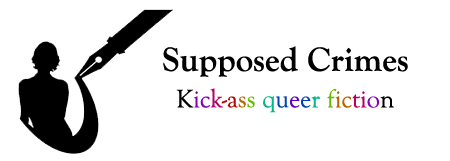
I read this article recently, an answer to a question on Quora: What do fiction authors get wrong when writing LGBTQ+ characters? Aside from the fact that the response is one long advert for this person’s book, it doesn’t really answer the question. Instead, it’s a long list of ways that the novel’s LGBTQ+ people are cheating on each other and who the story “represents.”
It stood out to me that the majority of the person’s story seems to be about love triangles and/or cheating. While that’s certainly one approach, that is not a particularly good explanation of how to get queer relationships “right.” It’s telling to me when the bisexual characters are repeatedly treated as unfaithful, flakey, and “representing heterosexuality.”
The original question was, what do people get wrong? It certainly isn’t a failure to have multiple cheating partners. The opening part of the article did have at least one good thing to say, though: it really matters how a character perceives themselves and their relationships compared to how others view them.
I’m not at all one of those folks who says, “Just treat your characters as HUMAN!” That doesn’t quite hit on things only queer folks experience. (And that’s not to say non-queer folks can’t write about us quite well, with adequate understanding and research.)
The article made me think about how I move through the world as a bisexual nonbinary person with a lot of LGBTQIA+ friends and family. About all the times I don’t correct people misgendering me because it’s just easier not to open myself up and be vulnerable. All the times I don’t comment on posts from friends about celebrity crushes. The ways I avoid outing friends or family if I don’t know whether someone else already knows about them. The differences between how I interact with the world compared to how my children (both queer and very open) do.
So where do writers miss the mark? It often boils down to a failure of empathy. Not a failure of pity or compassion—there’s plenty of that, and it’s not always needed or wanted. Some years ago, during a blog hop, I had to stop reading because a not-insignificant number of the posts expressed “feeling sorry for” us LGBTQIA+ folks. It’s a nice sentiment, but it doesn’t make great writing.
No, the problem is usually one of not putting themselves in our shoes. Empathy is the ability to see through someone else’s eyes and share their joy, frustration, and pain as if it were your own. It’s not good to try to do this at every level in life; doing so can lead to burnout, and there are times when it’s not possible. But when it comes to writing, we have to be able to connect at that deeper level with our characters. Otherwise, they’re flat and insincere.
There is no universal Queer Experience, but most of us do share some commonalities. The one thing I advise non-queer folks about is writing coming out stories. These remain ours to tell in our own ways, especially because they are a) very personal; b) often a matter of doing so repeatedly for a lifetime, not a singular event; and c) not the dramatic/traumatic affair most non-queer folks seem to assume. And yes, the process of coming out to ourselves is part of that.
(I’m not going to “officially” tell anyone this is off-limits, but I do want it clear that I strongly advise against it for those reasons. If you’re prepared to deal with it in a non-problematic way and have the insight and knowledge to back you up, go for it. Otherwise, you’re on some thin ice.)
As long as your writing reflects empathy (rather than projection), you’re golden. You don’t have to analyze every single relationship under a microscope, and you certainly don’t need detailed love triangles and cheating to make an authentic story.
